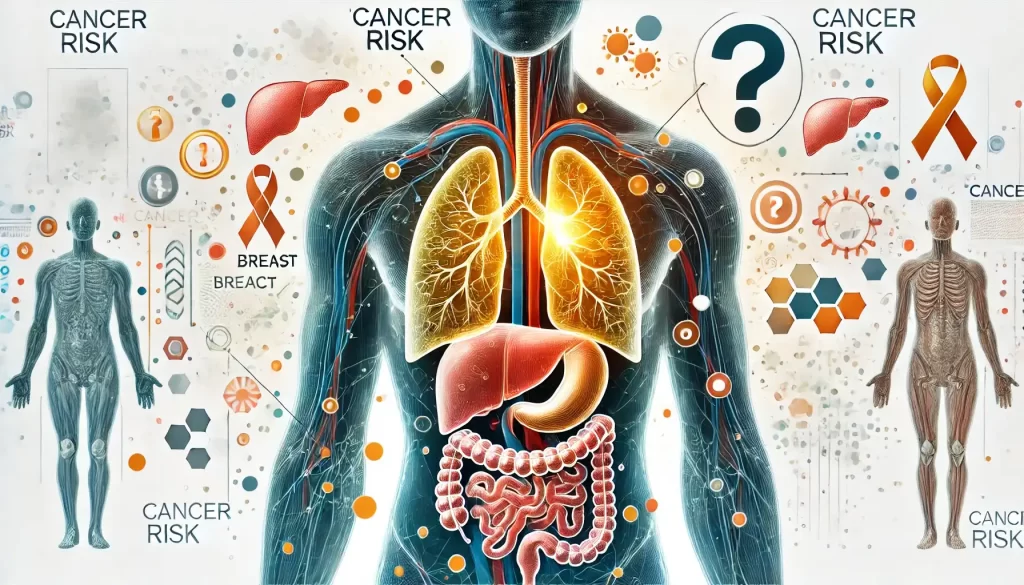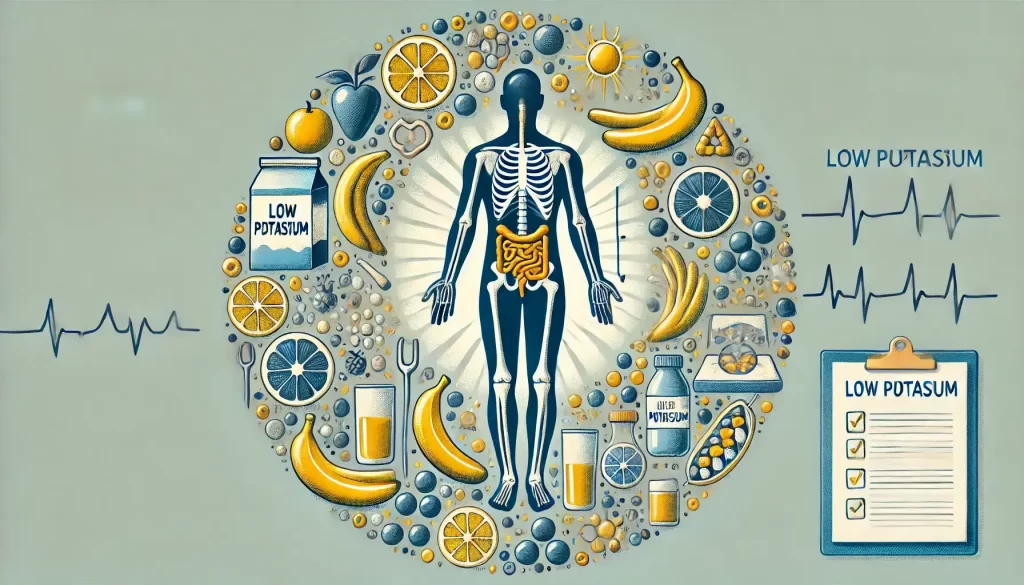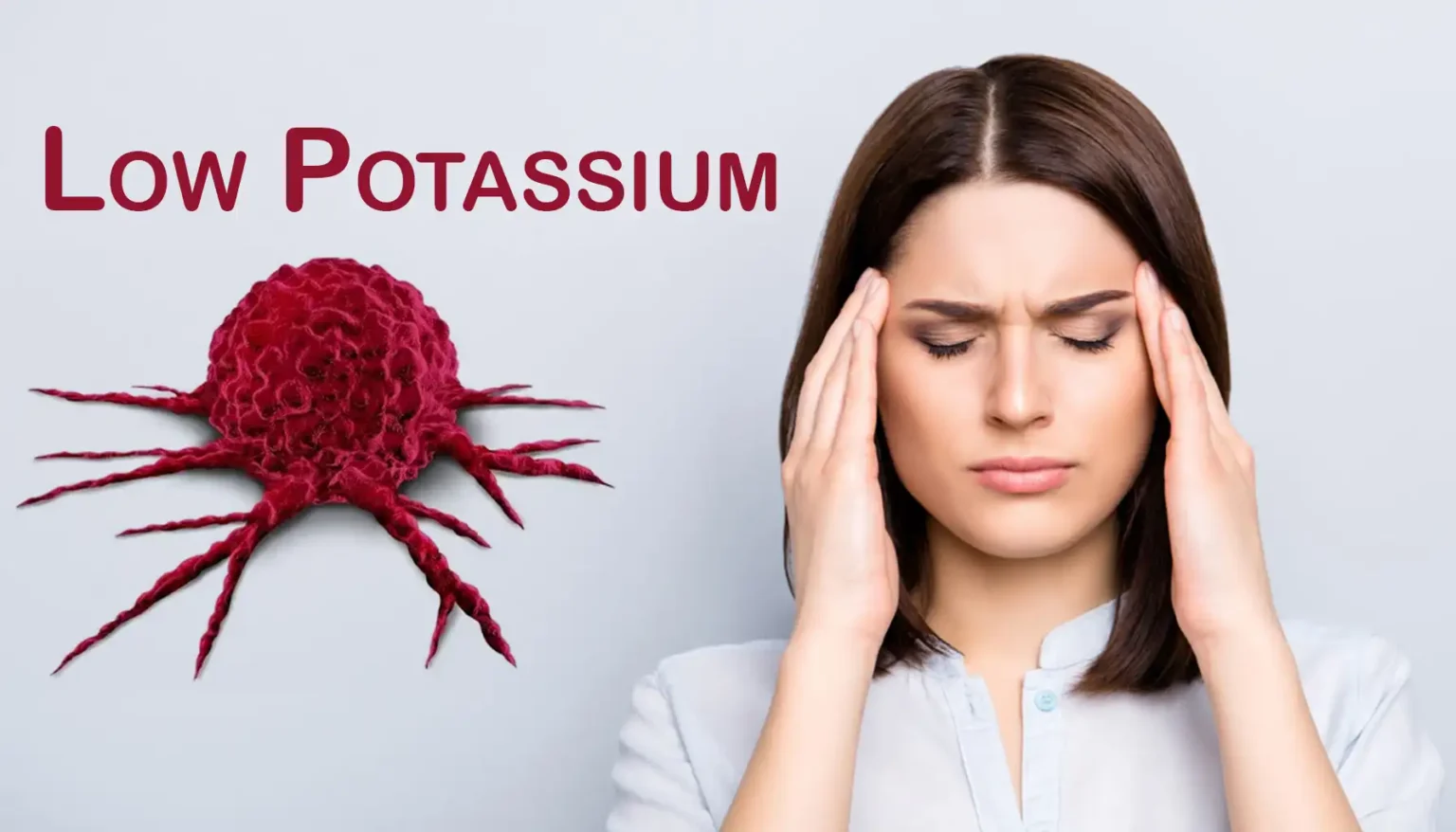Exploring the Link: Does Potassium Influence Cancer Risk?
In our quest to understand the complexities of human health and disease, the role of essential nutrients like potassium becomes a focal point. This vital mineral, often overshadowed by its more discussed counterparts such as calcium and vitamin D, plays a critical role in maintaining cellular function and overall well-being. As we dive deeper into the intersection of nutrition and chronic diseases, particularly cancer, the relationship between low potassium and cancer risk demands closer examination.
What is Potassium? Understanding Its Role in Your Health
Potassium is a significant player in the symphony of your body’s essential nutrients. Primarily recognized for its role in maintaining fluid balance and nerve function, potassium also helps regulate heart rate and ensures proper muscle contraction. Found abundantly in bananas, oranges, cantaloupes, and leafy greens, it is not just a nutrient but a lifeline for cellular operations. Beyond its basic functions, potassium is pivotal in conducting electrical charges in the body, a process essential for life-sustaining activities from cellular communication to the rhythmic beating of the heart.
The Cancer Conundrum: A Brief Overview
Cancer remains one of the most intricate and formidable health challenges of our time. Characterized by the uncontrolled growth of cells, cancer affects millions globally each year, with numerous factors from genetics to environmental influences playing a role in its development. Among these, dietary components, including mineral intake, have been scrutinized for their potential impact on cancer risk and progression. The exploration into how micronutrients like potassium may influence cancer pathways is not only fascinating but crucial in the broader context of preventive health strategies and cancer therapy.

The Science of Potassium in the Body
Potassium, a mineral and electrolyte vital for human life, orchestrates a symphony of cellular activities critical to health. Its role extends beyond mere participation in bodily functions to being a cornerstone of cellular integrity and physiological equilibrium. This article delves into how potassium operates within the human body, its management by various biological systems, and its pivotal functions at the cellular level.
How Your Body Manages Potassium
The human body exhibits an exquisite mechanism to regulate potassium levels, ensuring they remain within a narrow range essential for cellular function and overall health. Kidneys play the starring role in this regulatory process. Through a complex symphony of filtration and reabsorption, the kidneys adjust the excretion of potassium based on dietary intake and the body’s current needs. This balancing act is crucial, as even slight deviations from the norm can disrupt the electrical gradients that are vital for nerve transmission, muscle contraction, and heart function.
Potassium balance is also influenced by factors such as hormone levels—particularly aldosterone, which signals the kidneys to increase potassium excretion when levels are high. Additionally, the body’s pH balance can affect potassium levels; for instance, acidosis can lead to potassium moving out of cells into the bloodstream, altering the potassium levels that the kidneys must then address.
Key Functions of Potassium in Cellular Health
At the cellular level, potassium is paramount for maintaining cellular osmotic pressure and volume, which helps keep cells at their proper size and ensures that they function optimally. This mineral is essential for the polarization and depolarization of cellular membranes—a process critical for nerve impulse transmission, muscle contraction, and heart function. Every heartbeat is a testament to potassium’s role, as it helps to regulate heart rate and rhythm by coordinating the electrical signals that govern heart contractions.
Moreover, potassium is integral to the synthesis of protein and nucleic acids, underscoring its role in growth and repair. It activates various enzymes necessary for metabolism, converting glucose to glycogen, and facilitating efficient energy utilization. In neurons, potassium’s ability to manage action potentials ensures rapid and precise communication throughout the nervous system, highlighting its role in cognitive functions such as memory and learning.
What Causes Low Potassium?
Potassium, an essential mineral, is vital for various bodily functions, including proper nerve function, muscle contraction, and maintaining fluid balance. Despite its importance, low potassium levels, medically known as hypokalemia, are a common health issue. Understanding the factors that lead to this condition is crucial for maintaining optimal health.
Common Culprits Behind Potassium Deficiency
One of the primary causes of potassium deficiency is inadequate dietary intake. Potassium is abundant in many foods, particularly fruits like bananas and oranges, vegetables like potatoes and spinach, and beans. When these foods are not regularly included in one’s diet, potassium levels can drop, leading to deficiency.
Moreover, excessive fluid loss through prolonged vomiting, diarrhea, or sweating can lead to significant potassium depletion. This is often seen in athletes or those engaging in rigorous physical activity without adequate hydration and electrolyte replenishment. Diuretic medications, which increase urine production to remove water from the body, can also cause potassium levels to fall if not properly managed.
How Diet Influences Potassium Levels
Diet plays a pivotal role in maintaining potassium balance. A well-rounded diet rich in fruits, vegetables, dairy, and whole grains typically provides sufficient potassium to meet daily requirements. However, modern dietary habits, which often lean towards processed foods with low potassium content, can lead to insufficient intake. Additionally, excessive consumption of salt, which contains sodium, can further disrupt potassium balance. Sodium and potassium work in a delicate balance to control fluid levels in the body; high sodium intake can increase urinary potassium excretion, lowering potassium levels.
The Impact of Chronic Illnesses on Potassium Balance
Chronic illnesses significantly impact potassium levels in the body. Conditions such as renal disease impair the kidneys’ ability to regulate potassium, often leading to either accumulation or excessive depletion. Similarly, disorders like type 1 diabetes can affect potassium levels due to fluctuations in insulin and its impact on potassium movement into and out of cells.
Furthermore, hormonal imbalances, such as those involving aldosterone—a hormone that helps regulate potassium—can disrupt potassium homeostasis. For example, conditions like Addison’s disease (wherein the body produces insufficient amounts of certain hormones) or hyperaldosteronism (excessive production of aldosterone) can lead to problematic shifts in potassium levels.
Exploring the Cancer Connection
In the quest to understand the complexities of cancer, researchers continually examine various environmental, genetic, and dietary factors. One such dietary consideration is potassium—a vital mineral known for its role in cellular functions and overall health. This article delves into the association between potassium levels and cancer, providing insights from scientific studies and real-life case studies.
Overview of Cancer and Its Causes
Cancer is characterized by the uncontrolled growth of cells that invade and cause damage to surrounding tissue. Its development is influenced by a myriad of factors, ranging from genetic mutations to environmental exposures and lifestyle choices such as diet, physical activity, and tobacco use. At the cellular level, cancer often begins due to damage or mutations in the DNA, which may be exacerbated or mitigated by the body’s nutritional environment, including the availability of essential minerals like potassium.
Scientific Studies: Is There a Link Between Low Potassium and Cancer?
Recent scientific inquiries have probed whether there is a substantive link between low potassium levels and an increased risk of developing cancer. Potassium is crucial for maintaining cellular electrical balance, the transmission of nerve signals, and the contraction of muscles, including those in the gastrointestinal tract which can influence toxin removal and cell health. Studies have suggested that potassium’s role in cell cycle regulation and apoptosis (programmed cell death) might influence cancerous processes.
Research examining population dietary intakes and cancer incidence rates provides some correlation data, indicating regions with lower average potassium intake sometimes show higher rates of specific cancers. These epidemiological studies suggest a potential relationship that warrants further biochemical and clinical trials to clearly define how potassium levels directly impact cancer cell metabolism and growth.
Case Studies Highlighting Potassium Levels in Cancer Patients
Case studies of individual cancer patients often reveal nuanced stories about the interplay between diet, nutrient levels, and disease progression. For instance, in cases of gastrointestinal cancers, patients with higher dietary potassium intake have occasionally shown slower progression rates, suggesting that potassium may help manage the pace of disease advancement. These individual narratives are backed by reviews of patient medical histories and dietary habits, which highlight a pattern of lower potassium levels in some patients with advanced cancer stages.
In addition, some clinical interventions that have increased potassium intake through dietary changes or supplements have been associated with improved patient outcomes in terms of symptom management and overall vitality. These observations are crucial as they add real-world experiences to the data collected from more controlled scientific studies.
The Role of Potassium in Cellular Function and Cancer
Potassium, a vital mineral, is more than just a component of our daily diet. It is fundamental to the nuanced processes that sustain life at the cellular level. Understanding its role can shed light on how our bodies function and potentially how they respond to diseases like cancer.

How Potassium Affects Cell Function
Potassium ions play a critical role in maintaining cellular homeostasis and function. They are crucial in maintaining the cellular membrane potential, which is essential for the transmission of nerve impulses, muscle contraction, and heart function. This electrical gradient across cell membranes is vital for the activation of various cell signaling pathways that influence everything from hormone release to muscle contraction and neural communication.
On a molecular level, potassium helps regulate the volume of cells, which is integral to maintaining cellular integrity and function. By controlling osmotic balance, potassium ensures that cells do not become too dilated or contracted, which can disrupt cellular operations and lead to cellular distress or apoptosis (programmed cell death).
Potassium’s Role in Cell Growth and Division
Cell growth and division, processes central to life and development, are influenced significantly by potassium. Potassium channels are known to be active during various phases of the cell cycle, particularly during G1, a phase of cell growth before DNA replication, and S phases, where DNA synthesis occurs. These channels help regulate the cell cycle and ensure that cells only divide when they are ready and it is safe to do so, preventing uncontrolled cell proliferation, which is a hallmark of cancer.
Moreover, potassium is implicated in the synthesis of proteins and nucleic acids, foundational components for cell growth and repair. This synthesis supports cellular health and ensures that genetic information is accurately replicated and transmitted to new cells, safeguarding genetic stability.
Could Low Potassium Trigger Cancerous Changes?
The question of whether low potassium levels could directly trigger cancerous changes is complex and still under extensive scientific scrutiny. Hypokalemia (low potassium) has been associated with impaired cellular function and may contribute to conditions conducive to cancer development. For instance, insufficient potassium levels can disrupt the cell cycle, leading to abnormal cell growth and division. This disruption can potentially lead to genomic instability, a condition where increased mutations can lead to cancer.
Low potassium may also weaken the cells’ ability to repair DNA effectively, increasing the likelihood of mutations during cell division. These mutations can accumulate over time, potentially leading to cancerous transformations if they affect genes that control cell growth and division.
Delving Deeper: Types of Cancer Possibly Linked to Potassium Levels
Exploring the intricate relationship between essential minerals and cancer risk, this article delves into how varying levels of potassium may influence the development and progression of certain types of cancer. We also examine the implications of potassium deficiency, the diagnostics involved, and management strategies.
Is There a Link Between Low Potassium and Breast Cancer?
Research has begun to explore whether there is a tangible link between low potassium levels and an increased risk of breast cancer. Potassium plays a crucial role in cellular functions and its deficiency could potentially influence cell proliferation in breast tissues. Although direct causation has yet to be definitively proven, emerging studies suggest that maintaining adequate potassium levels could be vital in managing breast cancer risk.
Investigating Colon Cancer: Can Potassium Levels Warn Us?
Colon cancer, one of the most common types of cancer globally, has been the subject of numerous studies to determine risk factors and preventive measures. There is growing interest in whether potassium levels impact colon health, given potassium’s role in cellular turnover and integrity. Lower potassium may disrupt cellular functions in the gut lining, potentially increasing cancer risk.
Kidney Health and Cancer: The Potassium Connection
The kidneys regulate potassium balance in the body, and their failure can lead to significant health issues, including cancer. Research indicates that chronic kidney disease, which affects potassium regulation, may increase the risk of developing kidney cancer. Understanding how potassium is managed in the body highlights the importance of kidney health in cancer prevention.
Symptoms of Low Potassium You Shouldn’t Ignore
Potassium deficiency can manifest in several ways, affecting various bodily functions. Symptoms to watch for include muscle weakness, fatigue, and irregular heartbeat. Severe cases might present with muscle cramps, constipation, or tingling and numbness.
Early Warning Signs of Low Potassium
Initial signs of low potassium often involve slight physical discomforts such as fatigue and muscle soreness, which are easily overlooked. Recognizing these early symptoms can prevent more severe consequences by prompting timely dietary adjustments or medical interventions.
When to Seek Medical Advice for Potassium Deficiency
It’s crucial to consult healthcare professionals if you experience persistent symptoms associated with low potassium, such as significant muscle weakness or cardiac irregularities. Early medical intervention can prevent complications, especially in individuals with risk factors for potassium loss.
Diagnosing Potassium Deficiency
Medical diagnosis of potassium deficiency involves reviewing patient history, assessing symptoms, and conducting blood tests to measure potassium levels. This helps determine the severity of the deficiency and guides the treatment approach.
How Doctors Test for Low Potassium
The primary diagnostic tool for detecting potassium deficiency is a serum potassium test. This simple blood test measures the concentration of potassium in your blood and helps doctors assess whether you fall within the normal range.
Understanding Your Lab Results: What They Mean for Your Health
Interpreting lab results for potassium levels involves comparing your values against established normal ranges. Results outside these ranges may indicate an underlying health issue requiring further investigation or immediate treatment.
Treatment Options for Low Potassium
Treatment for low potassium typically involves dietary modifications to include more potassium-rich foods like bananas, oranges, and leafy greens. In cases where dietary intake can’t correct the deficiency, supplements or intravenous potassium may be necessary.
Dietary Adjustments to Boost Potassium
Increasing dietary intake of potassium is often the first line of defense against hypokalemia. Incorporating a variety of fruits, vegetables, and whole grains can help elevate potassium levels effectively and naturally.
Supplements: What You Need to Know
When dietary adjustments are insufficient, potassium supplements can be an effective way to restore normal levels. It’s important to manage these supplements under medical supervision to avoid hyperkalemia, a condition caused by excessive potassium.
Managing Underlying Conditions to Restore Potassium Levels
Often, addressing conditions that cause or exacerbate potassium deficiency, such as kidney disease or gastrointestinal disorders, is crucial. Effective management of these conditions can help stabilize potassium levels and reduce the risk of associated health problems.
Conclusion: Empowering Yourself with Knowledge
Navigating the complex interplay between dietary minerals like potassium and health outcomes such as cancer risk can be daunting. However, by arming yourself with the right knowledge, you can take proactive steps to manage your health effectively.
Key Takeaways About Potassium and Cancer
Potassium plays an indispensable role in maintaining cellular functions that are vital for overall health. Here are a few critical points to remember:
- Regulation of Cellular Functions: Potassium is crucial in regulating heart rhythm, muscle function, and nerve signaling, all of which are essential for maintaining your body’s homeostasis.
- Impact on Cancer Risk: While direct links between potassium levels and cancer are still under investigation, maintaining adequate potassium levels is recognized as important for cellular health, which could influence cancer risk.
- Sources of Potassium: A diet rich in fruits, vegetables, beans, and nuts is an excellent way to ensure adequate intake of this vital nutrient, supporting not just overall health but also potentially mitigating cancer risks.
How to Stay Informed and Proactive in Your Health Journey
Staying informed and proactive about your health involves more than just understanding the nutrients your body needs; it includes knowing how these nutrients interact with your body to affect your health, particularly in relation to chronic diseases like cancer. Here’s how you can stay on top of your health game:
- Regular Health Check-ups: Routine medical screenings and blood tests can help monitor your potassium levels and other important health markers. Early detection of any imbalance can facilitate timely intervention.
- Educational Resources: Keep abreast of the latest research and guidelines by following reputable health and science journals, websites, and newsletters that discuss nutrition and cancer prevention.
- Dialogue with Healthcare Providers: Engage regularly with your healthcare providers about your dietary habits and health concerns. They can offer personalized advice based on your health profile and the latest medical research.
- Mindful Eating: Be conscious of what you eat. Incorporating a variety of potassium-rich foods into your diet can help maintain optimal potassium levels and potentially reduce cancer risk.
- Lifestyle Adjustments: Complement your diet with other healthy lifestyle choices, such as regular exercise, adequate sleep, and stress management techniques, all of which contribute to better health and reduced disease risk.


0 thoughts on “Is Low Potassium Linked to Cancer risk? Explore Now!”